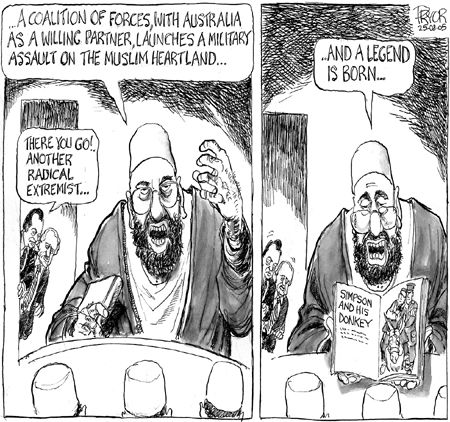August 25, 2005
liberalism and value pluralism
Public-policy questions are often difficult. The plurality of values on both sides of many public-policy debates creates reasonable bases for many-sided disagreements. In politics, unlike in personal life, we must try to justify hard choices to one another, and we are aften required to both seek a fair consensus and hedge our bets with respect to our own convictions by taking into account the "most cherished values" of people with whom we disagree. We quickly becomne aware that they are are better and worse ways of weighing and combining complex considerations.
Not all values in a liberal polity are commensurable: they may neither be reduced to a single over-arching value nor completely rank-ordered. That is the thesis of value pluralism, which is currently under attack from Australian conservatives. The cultural conservatives give every indication of wanting to reduce the diversity of values in the national culture of the nation-state to what they call 'Australian' values.In doing so they appear to have moved outside the horizons of liberalism.

Yet liberal societies such as Australia and the US generate social pluralism because liberalism affirms the individual's liberty to pursue "his/her own good in their own way'. Consequently, the freedoms that liberalism secures for citizens gives rise to a number of distinct visions of the good life, value, obligation, purpose, and human nature. These visions are often incompatible with each other; and since they are visions of the highest good and answers to big questions, the conflicts between them are difficult to resolve in ways that are acceptable to all concerned.
Despite sincere attempts to reach rational consensus, disagreement persists and reconciliation seems unlikely to be forthcoming. So social and value pluralism is here to stay. You cannot send all those citizens you disagree with packing.
Liberalism acknowledges cultural diversity and ethical pluralism in a liberal polity. The chief claim of liberalism, as a political theory whose tradition runs from Locke through Kant and Mill to contemporaries like the early Rawls, Dworkin, and Kymlicka---is that political and social associations exist for the sake of individuals. In a liberal political order, individuals are left free to pursue their aims unimpeded by the state, as long as their pursuits do not unjustly interfere with those of others. It is the job of the state to enforce these constraints; that is, state's primary function is to protect individuals from interference by other individuals and other nation-states.
The implication is that liberalism values social diversity and tolerance, in contrast to the traditional view that liberalism is just about abstract right and or market liberty: hence we have a multicultural liberalism that is about the protection of legitimate diversity. This position holds that value pluralism undergirds a kind of liberal politics, and it gives great weight to the capability of citizens and groups in civil society to live their lives in accordance with their deepest beliefs about what gives meaning and purpose to life.
However liberalism has a problem with value pluralism. Maybe this is why liberals become cultural conservatives.
Traditionally the liberal theorist has aspired to provide a philosophical account that will establish the universal legitimacy of the liberal political order. This has traditionally been done through an appeal to premises that can in principle win the assent of all. However, as social pluralism indicates that that there are no such foundational premises, liberal theory is inconsistent with the social pluralism that is the result of liberal practice. Liberalism generates a politics that renders its own requirements for legitimacy unsatisfiable. Hence the paradox of liberal justification.
Nussbaum, like many liberals, turned to John Rawls's political liberalism to for a justification of liberalism that is "independent of controversial philosophical and religious doctrines." Rawls argues that the stability of a liberal society, then, cannot rest on general agreement on a single comprehensive doctrine, nor can it rest securely a modus vivendi agreement among citizens. Rawls proposes that, if a liberal society is to be stable, then it must formulate its basic commitments in terms that can be the focus of an "overlapping consensus" among the comprehensive doctrines endorsed by its reasonable citizens: Each reasonable citizen sees the basic principles as an appropriate manifestation in the political realm of his own comprehensive doctrine.
So liberals need not become cultural conservatives.
Posted by Gary Sauer-Thompson at August 25, 2005 11:49 AM | TrackBack